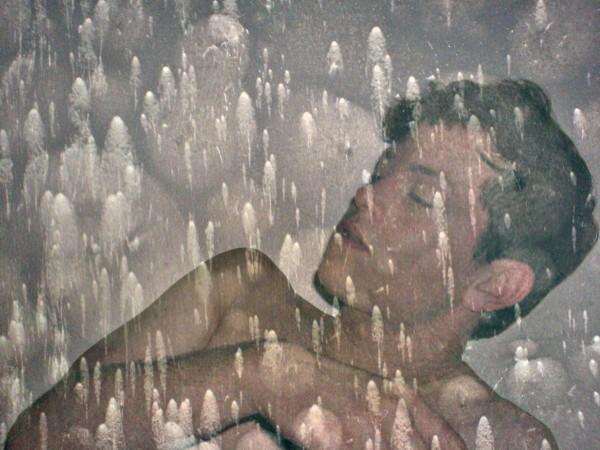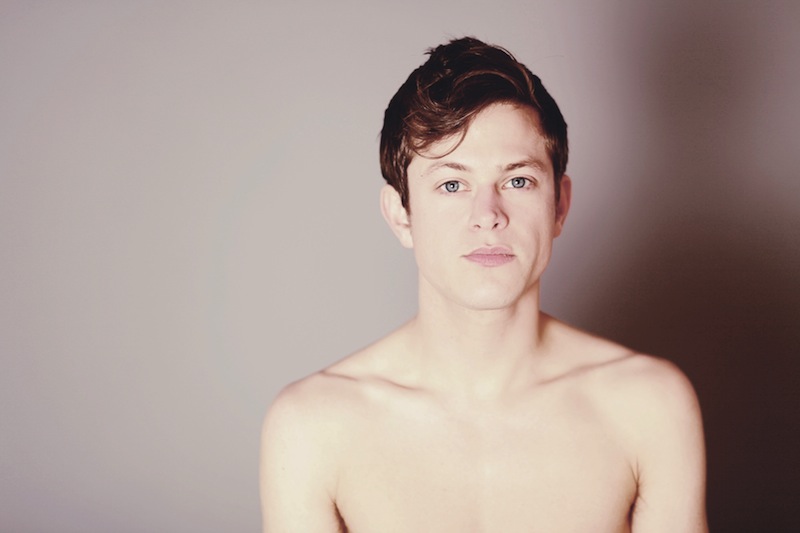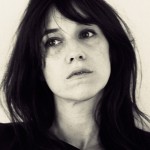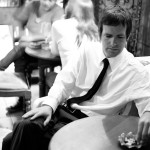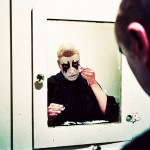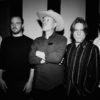Words by Christina Lee
As his fingers shift between piano chords, Mike Hadreas sings, “It’s all part of his plan/It’s all in his hands.†It sounds like a profession–but then, through billowing voices and a soft howl, comes a confession: “But I never asked for it.†He drags these words out, as if reluctant to admit defeat.
The song, “Never Did,†is the last in Learning–Hadreas’ debut as Perfume Genius and one of the most disconcerting releases this year. Though his jauntiest piano melodies could soundtrack the most innocuous of silent films, his trembling voice presents musings that would make standout entries to anonymous confession depository PostSecret.
Now 28, Hadreas spent three years in New York and Seattle socializing the only way he knew how–with drugs and alcohol. He then admitted himself to 30 days of rehab, before he settled into his mother’s Everett, WA, home and wrote Learning over the course of a year, the stories of his fellow patients still resonating.
In honor of Learning‘s June release, Hadreas has been playing select dates around Europe and the United States throughout the year–his first ever, aside from a piano recital at age 12. self-titled spoke with the singer-songwriter about his childhood piano lessons, rehab sessions, and life after Learning. He plays the Knitting Factory in Brooklyn tonight, and Philadelphia’s First Unitarian Church tomorrow.
Have you ever performed your music live before?
No, this is it. I haven’t performed period. It”s all very new to me.
You had talked about how you had taken piano lessons, from ages 7 to 15.
Yes. I guess I did do some piano recitals; does that count?
I mean…[Laughs] I had taken piano lessons myself, and I remember feeling weird at first. A ‘C’ was actually a good grade, and I wasn’t used to that sort of grading scale. Did you have to go through the same thing?
Well, I didn’t. We were never graded. My piano teacher would have her students at her house. A legitimate woman, that Maxine. But we did do one graded performance and I completely bombed. There was this passage that I just made up; I filled in the gaps of what I didn’t know. I felt really bad that I made it up right then.
How old were you?
I was probably, like, 12.
That must have been nerve-wracking.
I was a little brat. I don’t know if I thought too much about it. I probably felt like I was too cool for it, even though I really wasn’t at the time.
Did your mom make you take them?
No, I wanted to. I don’t know how I managed to want to do it and also be a brat at the same time. I guess I’m just not very studious, but I really liked it. I never learned how to read music or anything. I would babble at my teachers because I would want to play for them, but not the way they intended to. So I learned how to play by ear, but then I gave up.
I had a teacher who tried to teach me how to play by ear once. She’d play the songs and record them by tape, and then she’d tell me to listen to them as I fell asleep, hoping that they’d get ingrained in my brain. Is that what you went through?
No, but I like that. She would just play, and I would put my hands on top of her hands, and then she’d start playing, and then I just memorized little chunks of it each week. I knew what notes were, but I would write them all on the page.
Do you know how to read music now?
No, I don’t. Really, I could sit down and write down what all the notes are, but I don’t know what everything else means. It’s like learning another language. My friend that plays with me, he just put music in front of him and just plays it. I’ll watch him and be like, “Holy shit, how do you do that?”
It’s like learning two different languages, because you have the notes and the symbols, but then you have what I believe are French words–I mean, music reviewers overuse the word crescendo–but there’s also all the other words that describe the pace in which you play.
It’s insane. You have to like, multitask with your brain and your hands.
There’s just a lot going on.
I multitask. I read when I’m going to the bathroom. That’s about it.
Why did you move from Seattle to New York?
To get doped up. We’re being honest here.
Did you admit yourself to rehab immediately after that?
I don’t want to get deep down into that time when I was partying and doing drugs, but that is where I got my foot in the door. Then I moved back to Seattle and I kind of cleaned up, but it didn’t work because everything is over here too. Then I moved in with my mom, and pretty soon after that was treatment. And then I got out and stayed sober for a while with my mom’s place; that’s where I wrote the bulk of the album. Then I went out again for a little bit and now I’m back. I wasn’t really paying attention to my…anything really. And there was so much time at my mom’s place where I was clean and I wasn’t regressing, so everyday seemed the same for so long. There was no forward movement, so I didn’t really have any milestones. Like retirement.
“I thought I would down a couple bottles of Nyquil and just cut loose, so I’d feel like I had nothing to lose”
How did it feel to move back to the West Coast and live with your mom?
It wasn’t optimal. It wasn’t really my game plan, but it ended up being the most important thing that I’ve done, especially going to treatment. Cutting out drinking and drugs was really important too, but I don’t think I ever really learned how to be a person. I don’t think that had happened to me in my whole life, where I took responsibility for myself, and I saw everyone else too. I didn’t have enough room in my crazy brain for anybody else, for a long time.
Can you tell me about some of the people who you met in rehab?
I don’t think so. I don’t know if that’d be appropriate, really. It was cool to go in there and to see a lot of similarities with people whom you’d never would have thought. You feel like you’re so alone in the crap that you’ve created for yourself, and so to see people in all different ages and backgrounds who are going through the same thing. That was the most important part of it, to feel like you’re part of something for the first time.
How often were you talking to people there?
I don’t think I talked maybe for the first week; we’d just nap until a bell rung and it was time to do group therapy. [Laughs] And then I would try my best to not do that. But then I slowly started talking, and then I got the hang of it.
Are you a naturally shy person?
I think so. It was kind of weird, because I felt like I needed to talk about booze and drugs and stuff. I think that was a way for me to get out, a pretty classic way to get out of my shell. That’s how I was social, and that’s how I met people. Otherwise, when I would go home, I would lay down and I’d feel really disconnected. It was hard, trying to do that the healthy way.
I hear ya. Whether you’re doing them or dealing them, drugs can easily become the means of socialization.
It can be really confusing too, because I still care about some of those people–like my old dealer, who I’m really scared just to see as a normal person. But I’ve seen her now, like on the street. I would spend like, two or three weeks straight at her house and I’d be up all night and stuff. Those are really empty, scary experiences, but still, she was a part of my life. She contacted me after I had been sober for a few months, and all the people in the program told me not to respond to her, just to pray for her. And that was kind of hard for me to do. You have to take care of yourself and everything else will unfold and all your relationships will get better. You can’t really do everything.
It can be hard, to put yourself first.
When you’re doing all that, your world gets really, really tiny. And you think that’s what it’s like, that that’s just it. And I think some people, when they come out [of rehab], they don’t really see the other side, and you’re just ingrained in the way that you think about yourself and what your solution to that is, and you just never get out of it. I’m just really lucky that I had the kind of shift that I had, an idea that I didn’t have to do that anymore. And I think that’s like the biggest thing, that you actually don’t have to do that anymore–not that it’s easy, but I always felt like, there was no other way.
“Learning†is not only the first song on the album, but the first song that you wrote for the album. With that said, how did you know that “Never Did†would be your last song, and how did it feel to complete the album?
Honestly, when I was writing all those songs, I wasn’t thinking of how I’d compile them or put them all together; it came after the fact. But the only time I really thought about it was when I wrote that last song. Originally I was trying to write something hopeful, about how everything is out of your control and similarly, something about faith. And I couldn’t. I mean, I wasn’t really there 100-percent, for a long time. And for the other half of that song, I felt that I needed to be accepting.
So you’re saying that it could either be all about you, or it could be for someone else as well.
That’s what I’ve always tried to do. I’ve written songs that were angsty and personal, and I end up throwing those away. If I’m really being honest and looking at things, they end up being that way. Rather than when I just document things, the songs end up being universal. There can be a fine line sometimes, whether it’s confessional and something people can relate to, or something insipid. I don’t want to make stuff just about me anymore, and I don’t like listening to other people’s stuff that’s just about them.
Matador released Learning without even an MP3’s notice. Did you have any say in that?
That what’s was so cool about the whole thing. I didn’t know that all the people there would be so compassionate and would care so much. I think a lot of the reason why they did that was that they didn’t want to overhype it. I mean, I guess that’s a form of marketing there. [Laughs] So people could find it on their own and make their own judgment, rather than reading another one.
I read a live review that described how, after each song, you’d appear to visibly deflate a little. What goes through your mind as you perform?
I’m scared. I try to really invest all of my body when I’m playing. I don’t really have complex melodies or something, and I don’t even really feel like a musician sometimes, but I just try to communicate musically. I try to go back to when I wrote it, and when I was practicing or just playing a handful of tunes. But it’s not always super fun. It’s not like, party songs.
If you were ungrateful, I imagine you’d just be stumbling onto the stage, double-fisting beers and sloshing them all over the piano.
That’s always how I pictured it being like when I performed. I really did, I thought I would down a couple bottles of Nyquil and just cut loose, so I’d feel like I had nothing to lose. I don’t know. [Laughs] I’m just genuinely trying to be genuine, and I thought I’d have to drink to get to that. But I haven’t.
